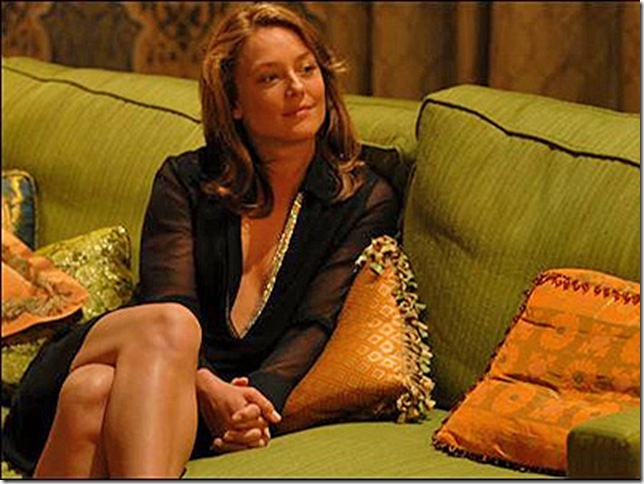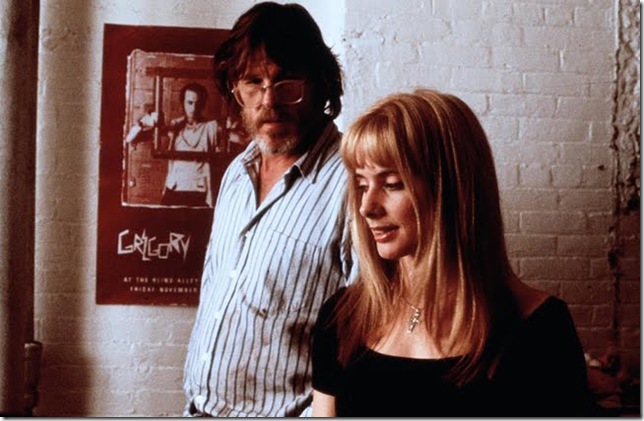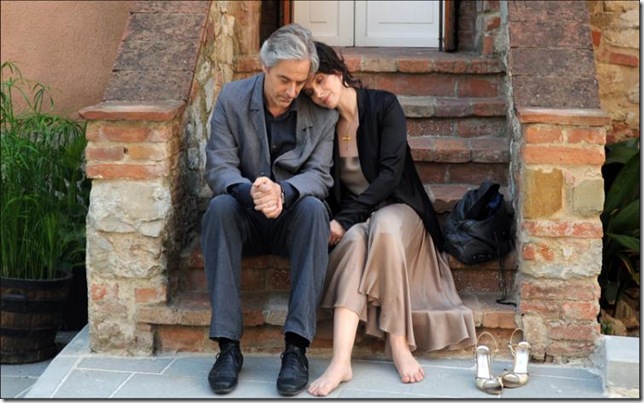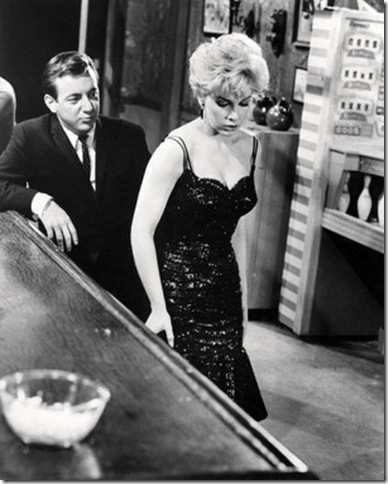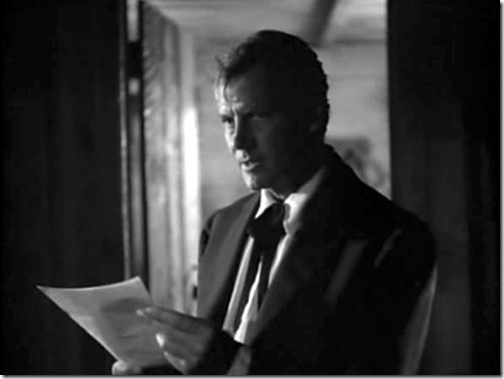Not since A Clockwork Orange has Beethoven’s music been imbued with as much primal sexual urgency as in The Kreutzer Sonata (Zeitgeist, $19.93), a present-day transplant of a controversial 19th-century novella by Tolstoy.
In the performance montage scenes of the titular sonata, the violin and piano play off each another like generous lovers. The players penetrate one another with their eyes, and the quickening violin strains crescendo toward an orgasmic climax before settling into a post-coital reticence.
Or at least that’s how Edgar (Danny Huston), the paranoid and probably psychopathic protagonist of The Kreutzer Sonata, sees it, and his paranoia becomes ours. The piano player is his wife Abigail (Elisabeth Röhm), and the violinist is a young Asian virtuoso named Aiden (Matthew Yang King). They have gotten together, at Edgar’s request, to perform the challenging sonata as a fundraiser for his charitable foundation.
Like Tom Cruise’s Dr. Harford in Eyes Wide Shut, it’s not long before Edgar’s mind becomes immersed in the lurid sexual fantasies he imagines Abigail enjoying with Aiden. With two time-consuming children to raise and a relationship fizzling under the labor of domesticity, Edgar grows increasingly insecure, voyeuristic and potentially violent. His response is extreme but his justification is plausible; wisely, screenwriters Lisa Enos and Bernard Rose keep open the possibility that his wife is being unfaithful, planting the nuggets of suspicion that metastasize inside Edgar like a cancer, eating away at his rationality.
Eschewing the moral puritanism that drove Tolstoy’s source material – amazingly, his Kreutzer Sonata was an argument in favor of sexual abstinence – director Rose offers a more realistic, sexually saturated environment. Erotic art and hotel pornography share screen time, and the carnal relations are inevitable and indeed desirable. Despite a few cross-cutting choices that distance the husband-and-wife sex scenes (a la Nicholas Roeg’s Don’t Look Now), the coitus in The Kreutzer Sonata is steamy in its matter-of-factness, refreshingly void of soft filters, dreamy incandescent light and the kind of abstract close-ups that obscure the naughty parts.
It’s all of a piece in a film that strives for, and almost always attains, a documentary naturalism. The movie is shot with spastic, handheld, faux-verité digital cameras, an approach that properly chafes against the immaculate elegance of Edgar’s palatial estate, puncturing his illusion of invincibility. Rose doesn’t reinvent any of the wheels of lo-fi indie filmmaking, but he rides atop them astoundingly well.
His dialogue, too, deserves praise for its naturalism; the final product has the air of an unscripted character workshop — in a good way. Even the dreaded voice-over narration, delivered by Huston in a Shatnerian staccato, feels both writerly and extemporaneous, a wholly welcome addition.
The Kreutzer Sonata treats its adults with respect even when they’re behaving foolishly, and its sobering excoriation of the limits of male jealousy will stick in your craw like a spouse’s mysterious text message. I’m not sure if Tolstoy would approve, but Beethoven, were he not deaf and dead, would probably appreciate the movie’s approach to the old in-and-out.
DVD Watch
May 15: One of the most interesting omnibus films of the past quarter-century arrives on Blu-ray today in 1989’s New York Stories (Mill Creek Entertainment, $9.98). Three directors who have used the Big Apple as their cinematic playground — Martin Scorsese, Frances Ford Coppola and Woody Allen — offer three short films set in, and typifying, the city. The general consensus, and it’s a correct one, is that only Scorsese’s film, with Nick Nolte as an unctuous artist, transcends the concept as a great stand-alone picture, but New York Stories is an enjoyable experiment nonetheless. Look for a cameo by an unknown Larry David in Allen’s segment.
Mill Creek Entertainment is apparently starting to curb the market on budget Blu-ray discs; the distributor is also releasing Before and After ($9.98), Barbet Schroeder’s 1996 drama with Meryl Streep and Liam Neeson as the parents of a teenage boy who is accused of murdering his girlfriend. The DVD version of this title has been out of print for some time.
Intrepid art-house distributor Olive Films is releasing a new, three-disc edition of 1900 ($24.96 Blu-ray, $19.93 DVD), Bernardo Bertolucci’s gorgeous, sweeping portrait of 20th-century Italy and its impact on two friends (Robert De Niro and Gerard Depardieu). The three-disc edition contains all 315 minutes of Bertolucci’s feature plus the 52-minute featurette Bernardo Bertolucci: Reflections on Cinema.
On the modern cult front this week, Criterion releases the best edition yet of Spike Jonze’s singularly innovative Being John Malkovich ($27.86 Blu-ray, $24.99 DVD). It includes the bonus features on the previous editions, plus newly recorded interviews with Jonze and Malkovich (in conversation with humorist John Hodgman) and a new behind-the-scenes documentary by filmmaker Lance Bangs.
May 22:Certified Copy, one of the most compelling and mystifying films of 2011, finally receives a home-video treatment more than a year after its all-too-limited theatrical run (Criterion, $29.99 Blu-ray, $28.83 DVD). Two mysterious characters, played by Juliette Binoche and opera singer William Shimell, meet for the first time – or so we think – at an art lecture in Tuscany. They spend the next 45 minutes or so wandering the city and getting acquainted, before they – and the film’s brilliant director, Abbas Kiarostami – suddenly pivot, essentially becoming different people. Were they playing characters (copies of themselves) the entire first half? Does it matter?
A reflection on storytelling, the nature of art and the nature of love and relationships, Certified Copy is an intellectual exercise worth multiple viewings and multiple viewpoints, which this edition is sure to provide. It includes an interview with Kiarostami, an Italian documentary on the making of the film and, most crucially, the home-video premiere of Kiarostami’s 1977 feature The Report, about a tax collector who is accused of taking bribes.
Also of interest this week: Perfect Sense (IFC, $24.99 Blu-ray, $12.99 DVD), an apocalyptic new sci-fi thriller under the direction of provocateur David Mackenzie. Ewan McGregor and Eva Green fall in love in a world that has lost its five senses. And the documentary Bettie Page: Dark Angel (Cult Epics, $16.93 Blu-ray) explores the final three years of the pin-up queen’s tumultuous life, including recreations of Irving Klaw’s lost bondage films.
May 29: Finally! John Cassavetes’ Too Late Blues, one of the most anticipated home-video releases in years, hits retailers from Olive Films ($26.96 Blu-ray, $17.93 DVD). The second feature from the independent maverick stars Bobby Darin as a nomadic jazz bandleader trying to keep his crumbling band intact while falling in love with a sultry soul singer with a troubled past (Stella Stevens). This week also marks the home-video debut of Nicholas Ray’s Run for Cover (Olive, $26.96 Blu-ray, $22.46 DVD), the director’s follow-up to his classic gonzo western Johnny Guitar, about a wrong-man ex-convict (James Cagney) who becomes a local sheriff.
Just in time for summer, Ingmar Bergman gets a double dip of seasonal dramas with Summer Interlude and Summer With Monika ($19.99-$27.99 Blu-ray, $14.99-$21.99 DVD). The latter is one of the director’s sexiest and most luminous movies, finally available in a transfer befitting its erotic splendor. It’s chock-full of special features, while Summer Interlude is an almost bare-bones disc, which is why it’s the far cheaper of the two.
June 5:A bonanza of Blu-ray premieres rule the week, with Clint Eastwood’s underrated masterpiece A Perfect World ($15.83) and his solid cop thriller Blood Work ($14.99) due out from Warner Home Video. 20th Century Fox unveils The Grapes of Wrath ($19.99), possibly John Ford’s greatest achievement, and Universal bows three fully loaded editions of The Sting ($24.96 Blu-ray Book, DVD and digital copy; $14.95 Blu-ray, DVD and digital copy and $11.93 DVD and digital copy).
TCM Watch
At 12:45 a.m. May 16, set your DVR for Stars in My Crown, an American Western starring Joel McCrea and directed by French noirist Jacques Tourneur. Tourneur successfully transplants urban paranoia into a Western setting, and his film is one of the fiercest excoriations of racism I’ve seen anywhere. This movie is semi-rare, having only been made available on a limited Warner Archive DVD.
The brightest jewel in TCM’s May schedule is Jean Renoir’s A Day in the Country, which runs at 4 a.m. May 20 (following the director’s more readily available Rules of the Game). A curious footnote in Renoir’s impeccable career, the 40-minute Day in the Country is a bittersweet comic vignette that was supposed to have been expanded into a feature but was stymied by Renoir’s self-admitted “creative block.” At any rate, it’s never been released on DVD in the States.
At 4:30 a.m. May 28, TCM is running Don Siegel’s 1955 drama An Annapolis Story, a two-guys, one-girl romance set in a naval academy, which has earned comparisons to the early Oscar winner Wings. It has never been released on DVD. Finally, Let Us Live, running at 4:45 a.m. June 9, is an interesting prison drama with Henry Fonda and Maureen O’Sullivan, directed by the undervalued technician John Brahm, that also has never seen a home-video release.
